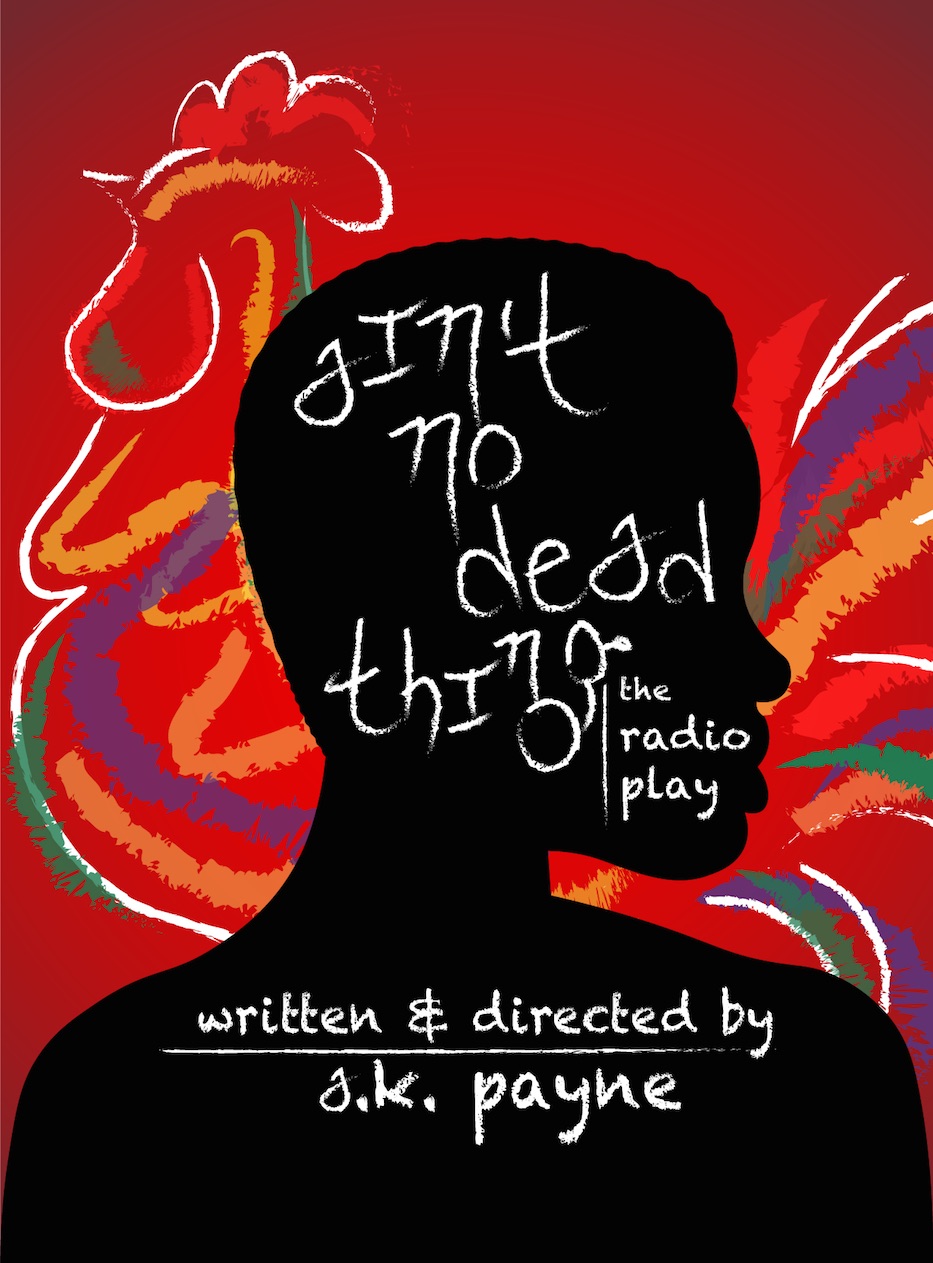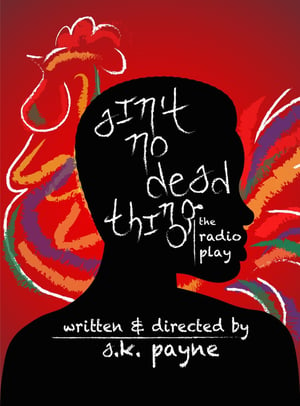
Radio & Audio | Arts & Culture | Theater | COVID-19

| From left to right: Co-Artistic Directors Alex Vermillion, Brandon Burton, and Zachry J. Bailey, and Managing Director Jaime Totti. Photo by Blaq Pearl Photography. |
The year is 1921, deep in the heart of Tulsa, Oklahoma. The setting, a little diner. Outside, the warm air stirs, agitated by something it can’t name. Inside, lovers gather. They are on the lip of one of the greatest race-based massacres in American history, and nobody knows it yet.
A century away, listeners can travel back to them with the flip of a radio switch. Or more aptly, a streaming device.
Welcome to the reimagined Yale Cabaret, which is finishing its 52nd season with radio dramas, sweeping DJ sets, virtual affinity spaces and original work on “KCAB Radio” in the midst of COVID-19. This weekend, the theater will mount a.k. payne’s Ain’t No Dead Thing as the latest work in its season.
Performances, which are free, run Friday and Saturday at 8 p.m. on KCAB Radio. In the spirit of the theater, there is a pre-show DJ set to get patrons in the mood, and the show will be followed by a talkback and dance party. Future Cab performances will be posted to the website; the season will come to an end virtually on May 3.
“KCAB is a chance for people to invite us into their homes,” said Brandon E. Burton, one of the Cab’s three co-artistic directors, on a recent Zoom call with the full artistic team. “There wouldn’t have been the same opportunities to do this in physical space. Now we have an opportunity to bring in the outside world.”
The concept of KCAB Radio was born almost a month ago, after Yale sent its student body home for the rest of the semester. On March 12, the Yale Repertory Theatre cancelled the remainder of its season, including Carl Cofield’s production of A Raisin In The Sun. Burton, who had been cast as Bobo, recalled feeling crushed. The show would have opened previews on March 13, when instead New Haven shuttered its schools and started a city-wide shutdown.

“There’s this pandemic that’s affecting everybody, and it just so happens to be hitting at a point that would be this huge celebration, this point of passing through a gateway,” he said. “I think that when Raisin got cancelled, that gave me the onus I needed to have a cathartic release.”
The cancellations kept rolling in. In addition to the Rep’s season, Yale nixed all student performances, including the school’s annual Dwight/Edgewood Project and springtime festival of new works. Graduation was cancelled. Suddenly, it didn’t matter that the Cab’s artistic team was in the same place (they have all remained in New Haven during their isolation). Their season as they knew it—and the gathering space they’d turned into a second home—had gone dark.
In their professional lives, they were looking at a theater landscape that had changed almost overnight. Burton lost an entire summer of work. Co-Artistic Director Alex Vermillion, who uses the pronouns ze/zir, had started the semester focused on embodied dramaturgy and watched the work ze’d been building up to get cancelled. Co-Artistic Director Zachry Bailey had been working as the stage manager on A Raisin In The Sun, and felt disappointed when the show came to a halt.
“We took some time to mourn,” said Managing Director Jaime Totti. “We took a couple of days or so. And then we started shifting.”
“Part of our discipline is to bring people together to make art and tell stories,” Bailey added. “What does it mean to talk about our craft when we can’t do our craft right now?”
Then they shifted entirely into digital space. The four jumped on their group chat, which all of them described as keeping them sane. They tried to assess not only their needs, but the needs they saw within the School of Drama and wider Yale community.
All of them—who at different points in the Zoom call spoke about keeping each other sane—wanted to keep the feeling of their Cab season alive for as long as they could. In addition to new, community-focused “dark nights” that the group rolled out, they have produced nine new works, four award-winning plays, and a drag show with one night of New Haven queens.
“We know that the Cab functions as an oasis,” said Bailey. “And so we sat down [virtually] as a team and we asked: what does that look like for us and what does that look like for the community?”
Noel Nichols, a second-year sound designer who has also been the Cab’s sound design artistic associate this season, suggested a radio play. She sketched out a format in which it could work with the final three shows of the year. The artistic team got back to work.
“It was incredibly exciting,” Burton said. “I have an ample record collection and a great record player. So I was like, ‘How can we couch this radio play experience in something that feels like walking into the Cab?’ How do we contextualize this new format? When we think about KCAB radio, what does that look like?”
Because the Cabaret is designed as a long, immersive experience—patrons arrive beforehand, order dinner and drinks, and then stay for a show and sometimes a talkback—the artistic team wanted to create a similar feel through the airwaves. In addition to radio plays, they are building 90-minute DJ sets that will be mixed live before each show and talkback-esque and affinity group spaces afterwards.
Burton said the pre-show sets are an homage to Chef Dana Cesnik Doyle, who typically provides the Cab’s dinner service through her company Queen of Tarts Catering. In the absence of food, he’s hoping that the music can help listeners “get your body ready for the material that you’re going to see.”
Last weekend, the DJ sets alone attracted over 200 listeners. Members of the artistic team have also been recording riffs on the fire warnings that come before each show, to remind listeners that they can still be goofy in a time of quarantine.
This weekend, they are excited to roll out Ain’t No Dead Thing, which fits into the season’s community-based, barrier-busting mission. Set in 1921 Tulsa—the real-life site of one of the most racist and most frequently forgotten massacres in U.S. history—the show takes place inside a diner, where love and trust are put to the test amid profound devastation. Payne, who wrote the piece, is a 2019 graduate of Yale College.
After the show this weekend, the team will continue with KCAB radio through May, including a reworked version of its annual Satellite Festival. Bailey said he is especially excited for the festival, which will feature daily prompts, several Zoom performances, and a virtual meeting space and resource exchange for artists.
It’s not what they planned, he said. That part is a loss. But the show must still go on.
“I think that the Satellite Festival is this kind of unique beast,” he said. “We want to do it in a way that is intentional and supportive.”
Speaking at different points in the interview, members of the artistic team also said the decision to keep the Cab going has helped them navigate a semester upended by forces far beyond their control. Vermillion, who hails from the West Coast, noted that it marks the first time in years that zir friends and family can experience any of zir work.
“I’m feeling really proud about this season,” ze said. “I’ve cried a lot of tears, but some of them are joyous tears. There’s been a lot of joy amidst the chaos. I’ve had my peers reach out to me. Without them, I don’t know how I really would be functioning right now.”
Totti said this helps him round out the year with a greater sense of completion. For Burton, finishing a season from his apartment is one of the unexpected blessings he’s trying to stay focused on. The others include listening to his peers and taking time to play video games remotely with his younger sister.
“We did what we set out to do,” Bailey said. “When I talk to folks about the Cab [having to cancel], I’m selfishly happy because the community is like, ‘Shit!’ It makes it harder to wrap my head around this. But we have an impact. We have a little bit of a legacy. It’s there.”

